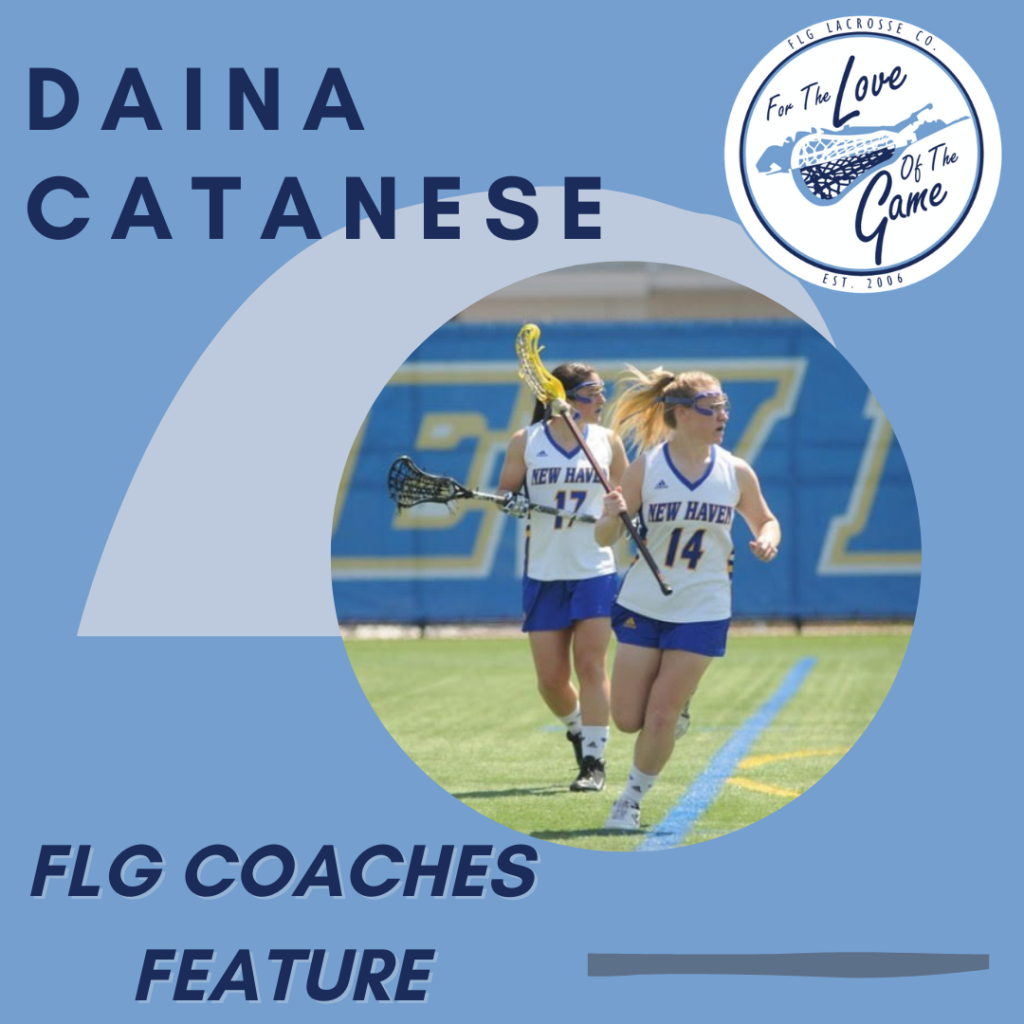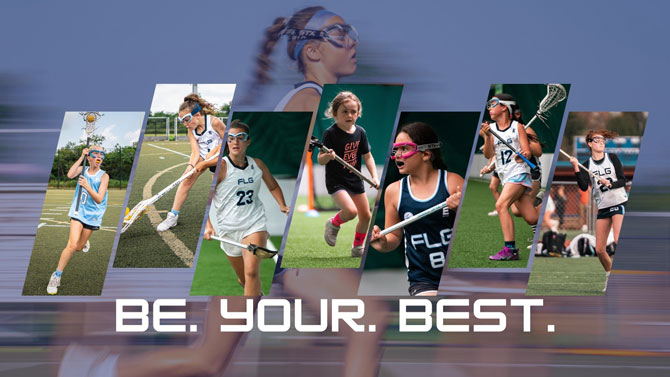FLG Lacrosse Coach Daina Catanese takes her experience from New Haven women’s lacrosse to her own sidelines. Her journey from midfielder to defense in college helped Coach Catanese to stress the importance of adapting to her own players. When she’s not coaching, Catanese works as a graphic designer and spends time creating her art or in the gym. For now, the most important part of coaching is adapting to the sports changes and evolution.
Q: What is your favorite part about coaching the next generation of lacrosse?
A: My favorite part about coaching the next generation is all the changes happening in the game. The shot clock is not something I had to adapt to but it will be for the next generation. I also love building up a players’ confidence. Seeing them drive to the goal and score when they would have never done that a year prior.
Q: What inspired you to begin coaching and stay a part of the lacrosse community post-college?
A: Lacrosse has changed my life in more ways than one, it shaped me into the person I am today. I am someone who likes criticism, camaraderie, competition, but I am also someone who is driven, can easily adapt, and is a team player. All of these things led me to becoming a part of community lacrosse programs to help the youth hopefully learn some of the same through this sport.
Q: During your time at New Haven, what was the most valuable lesson you learned about the sport of lacrosse?
A: If you want to be a part of a winning team, you need to be able to evolve. I was a stand-out player, and I was a midfielder who was very attack oriented. I did reps in defense but never truly committed to it. When I got to New Haven, my entire team was stacked with amazing players who had more years on me. My coach sat me down and told me that if I wanted to play, she was looking for another defensemen. I took on the challenge and began playing. I learned to adapt and to realize that if I wanted to be on a great and winning team, I was going to have to adapt to what the team needed.
Q: As a former defender yourself, what is special about coaching younger girls who play the same position? And how does it differ from coaching offensive players?
A: I enjoy coaching defense because I learned that it does in fact win games. I was a midfielder/attacker my whole life and found my love of defense and defensive strategy in college. I was a face-guard and was always assigned to the other teams’ top driver. It’s special to me because I can show the girls that winning isn’t just about scoring but by defending your goalie and your net. It is different than coaching attackers because the impact you have on the game is not necessarily always reflected on the scoreboard.
When a player scores, they see a point go up. When a defender causes a turnover, yes a goal for us may be a result but for most of the defenders who are doing a great job there is not a direct display of their efforts. So, trying to show the defenders how important it is to be doing their job is a goal of mine when coaching.
Q: What’s the best piece of advice you’ve received from either a former coach of your own, or fellow coaching staff?
A: To leave everything you have on that field. The years of playing competitively are numbered. Enjoy putting on your uniform, getting your hair braided, warming up, and the feeling of winning. Enjoy the ride, it doesn’t last long.
Q: When you’re not playing or coaching on the field, what’s your favorite thing to do in your free time?
A: I am a graphic designer by day and I am normally screen printing my designs in my free time. I also enjoy different fitness activities such as cross-fit, hiking and powerlifting.
Q: Are there any particular coaches, former teammates or professional players you keep in mind when coming up with drills or plays?
A: My college coach and Gordon Purdy are two people I keep in mind when coaching. Gordon taught me to always keep fun at the forefront of my coaching approach. My college coach taught me resilience and how to overcome challenges. Both coaches taught me how to be a better player and constantly challenged me to be better.
Q: When pressure’s on, what does your go-to pep-talk sound like in the huddle?
A: To remind my players that I believe in them. Lacrosse is an ever-changing game and no matter how well I prepare them, game time decisions are on them and I need them to know I support their choices. I may not be happy with every decision but I always said lacrosse is a game of mistakes, it’s just about who capitalizes on them the most. You drop the ball, go and get it. There are no “sorry’s” in lacrosse.
Q: How has the Covid-19 pandemic impacted your previous season? How has this changed your outlook on seasons to come?
A: Covid-19 has not changed any outlook on seasons to come. The idea of being resilient is something I expect my players to be able to do on and off the field. Just like in a game, you sometimes cannot change a call a ref has made. You just need to deal with it and get the ball back. I feel the same way about the pandemic. Players may not be able to come to practice but they can work on stick skills in their yard, they can go for a run, they can use at home workout equipment to ensure they are ready to play at any moment.
Q: Lastly, what do you look forward to most about the upcoming season?
A: I look forward to a year of growth and wins. I want my players to come out of this season more confident and more skilled than the way they came in. I am grateful for any time out on that field.


